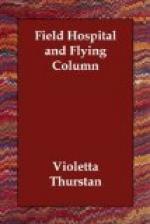We found the hotel closed when we got to it, and the people absolutely refused to let us come in, so we stood in the road for a few minutes, not knowing which way to go. Then a Red Cross doctor saw us, and came and told us to get under cover at once. We explained that we desired nothing better, but that the hotel was shut, so he very kindly took us to a convent near by. It was a convent of French nuns who had been expelled from France and come to settle in this little village, and when they heard who we were they were perfectly charming to us, bringing beautiful pears from their garden and offering to keep us for the night. We could not do that, however, it might have brought trouble on them; but we rested half an hour and then made up our minds to return to Brussels. We could not go forward as the Malines road was blocked with soldiers, and we were afraid we could not get back the way we had come, past the barbed-wire barricades, but the nuns told us of a little lane at the back of their convent which led to the high road to Brussels, about fifteen miles distant. We went down this lane for about an hour, and then came to a road where four roads met, just as the nuns had said. I did not know which road to take, so asked a woman working outside the farm. She spoke Flemish, of which I only know a few words, and either I misunderstood her, or she thought we were German Sisters, for she pointed to another lane at the left which we had not noticed, and we thought it was another short cut to Brussels.
We had only gone a few yards down this lane when we met a German sentry who said “Halt!” We were so accustomed to them that we did not take much notice, and I just showed my Red Cross brassard as I had been accustomed to do in Charleroi when stopped. This had the German eagle stamped on it as well as the Belgian Red Cross stamp. The man saluted and let us pass. Now I realize that he too thought we were German Sisters.
We went on calmly down the lane and in two minutes we fell into a whole German camp. There were tents and wagons and cannon and camp fires, and thousands of soldiers. I saw some carts there which they must have captured from the English bearing the familiar names of “Lyons’ Tea” and “Pickford” vans! An officer came up and asked in German what we wanted. I replied in French that we were two Sisters on our way to Brussels. Fortunately I could produce my Belgian Carte d’Identite, which had also been stamped with the German stamp. The only hope was to let him think we were Belgians. Had they known we were English I don’t think anything would have saved us from being shot as spies. The officer had us searched, but found nothing contraband on us and let us go, though he did not seem quite satisfied. He really thought he had found something suspicious when he spied in my basket a small metal case. It contained nothing more compromising, however, than a piece of Vinolia soap. We had not the least idea which way to go when we were released,




